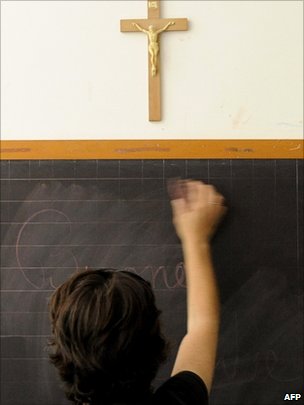School crucifixes 'do not breach human rights'
 The hanging of crosses in public buildings is not compulsory in Italy but it is customary
The hanging of crosses in public buildings is not compulsory in Italy but it is customary
Displaying crucifixes in schools in Italy does not breach the rights of non-Catholic families, the European Court of Human Rights has ruled.
The court ruled there was no evidence that a crucifix hung in a classroom would influence pupils.
The ruling overturned a previous decision made in November 2009, which angered the Roman Catholic country.
Friday's decision was welcomed by Italy's foreign minister as a win for European "popular sentiment".
"The decision underlines, above all, the rights of citizens to defend their own values and their own identities," Franco Frattini said, according to Italy's La Repubblica newspaper.
"I hope that following this verdict Europe will begin to examine issues of tolerance and religious freedom with the same courage," he added.
'Historic decision'
The Vatican too welcomed the decision. Its spokesman Federico Lombardi called it "an important and historic ruling".
The original case was brought by a Finnish-born mother-of-two who said public schools in the Italian town where she lived refused to remove the Roman Catholic symbols from classrooms.
The hanging of crosses in public buildings is not compulsory in Italy but it is customary.
Soile Lautsi had argued that the crucifix violated the secular principles the public schools are supposed to uphold.
“Start Quote
End Quote Massimo Albertin Husband of Soile LautsiFreedom of religion, freedom from discrimination, freedom of choice are fundamental principles and in this case they weren't respected”
But the final decision by the Strasbourg-based court's Grand Chamber said it found no evidence "that the display of such a symbol on classroom walls might have an influence on pupils".
Her husband said the family was disappointed and "disillusioned" by the ruling, saying it showed that the court did not respect the principles on which Italian society is built.
"Freedom of religion, freedom from discrimination, freedom of choice are fundamental principles and in this case they weren't respected," Massimo Albertin told AP from the northern Italian town of Abano Terme.
Friday's ruling focused on Italian public schools, and does not automatically force other countries to allow crucifixes in the public schools, according to the court.
But the ruling will affect all 47 Council of Europe member states as citizens in other countries who want religious symbols in classrooms could use it as a legal argument in national courts.
National governments could also the ruling as a justification to change laws on religious symbols.
In its earlier ruling the court had decided that the crucifix could be disturbing to non-Christian or atheist pupils.

 Putin denies Russia rift on Libya
Putin denies Russia rift on Libya Defiant Gaddafi pledges victory
Defiant Gaddafi pledges victory Knut's story
Knut's story Obama's war tent
Obama's war tent Emerging from chaos
Emerging from chaos Baptism by ice
Baptism by ice  Invisible hazard
Invisible hazard HARDtalk
HARDtalk